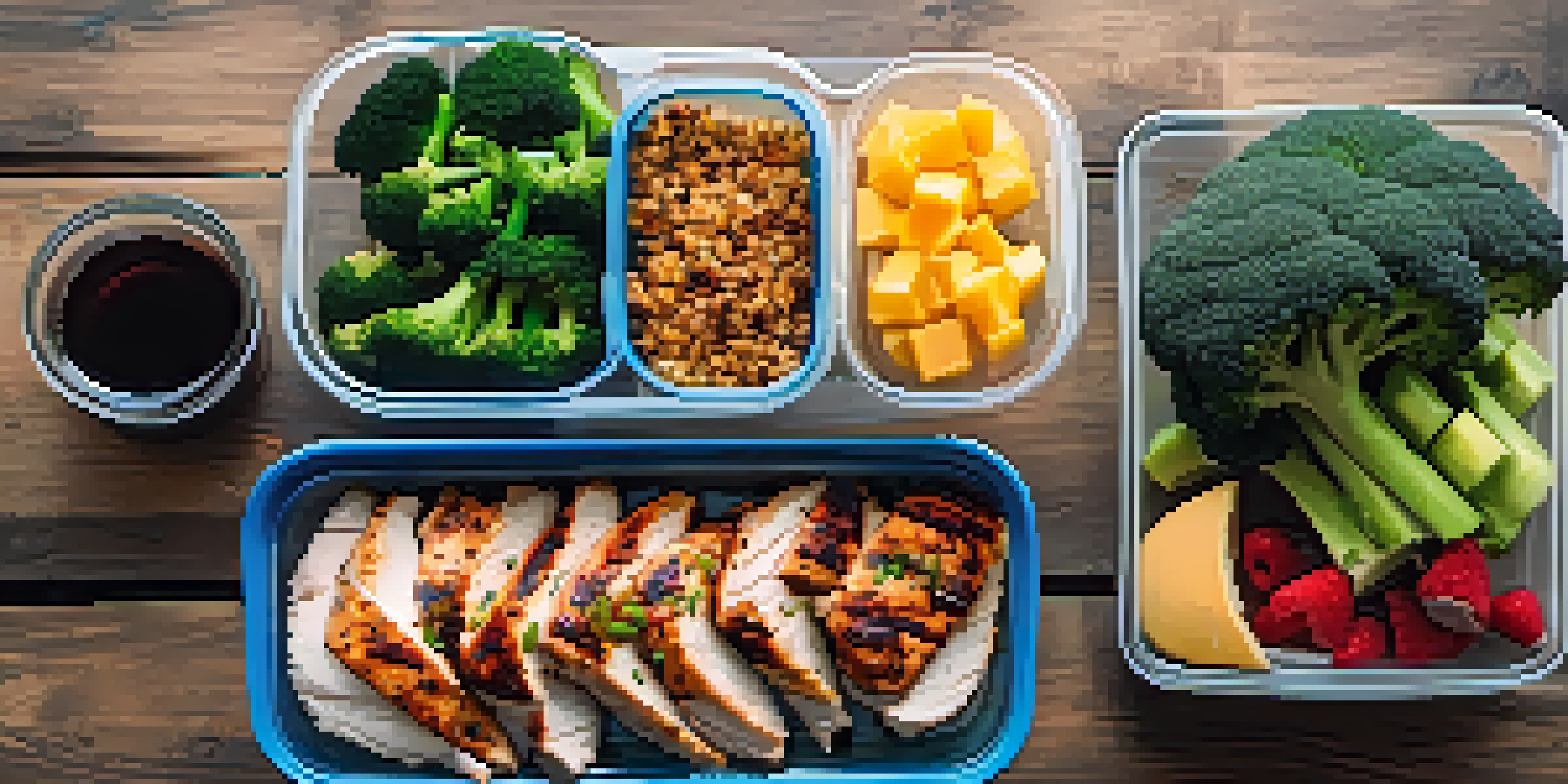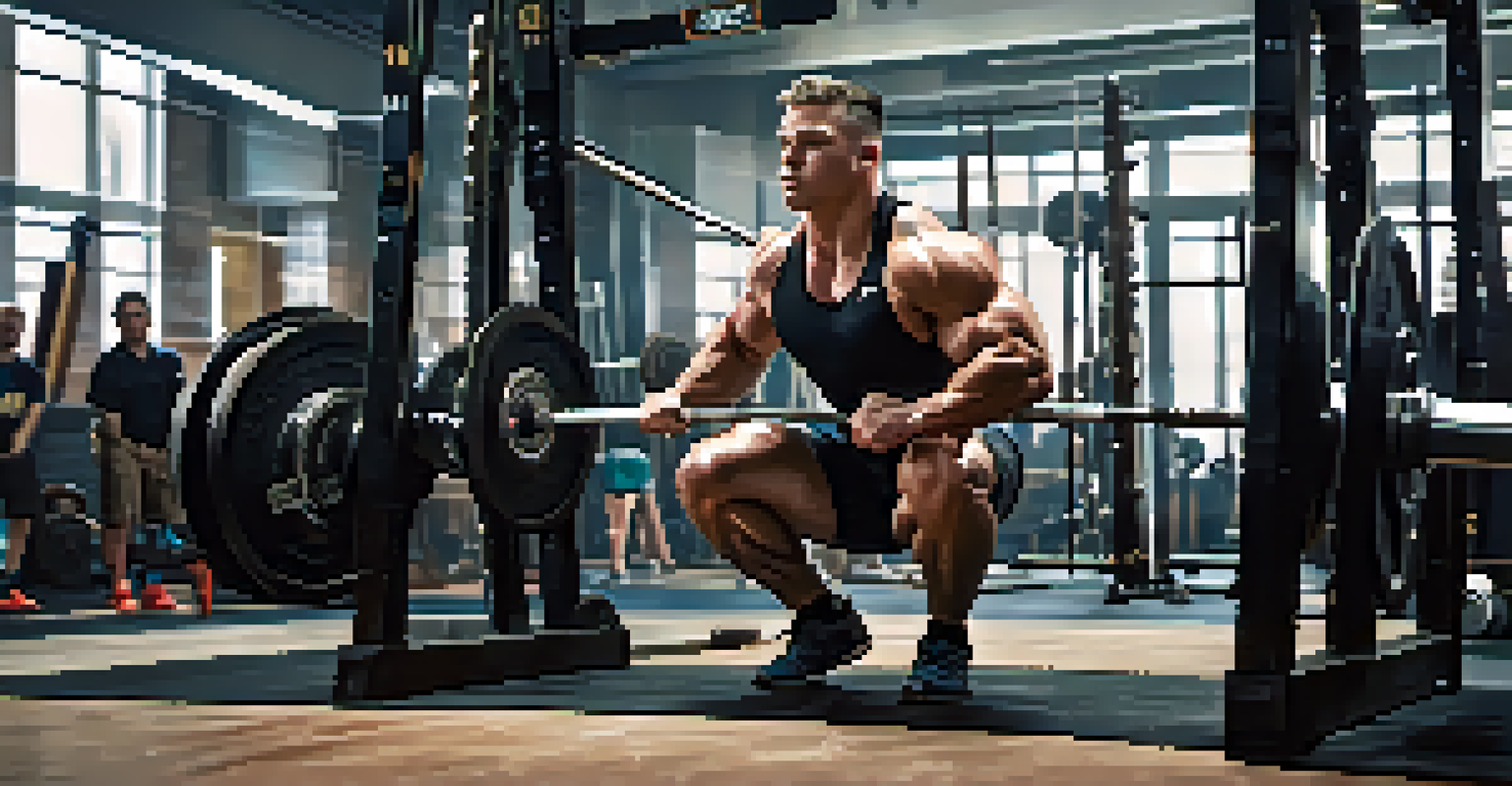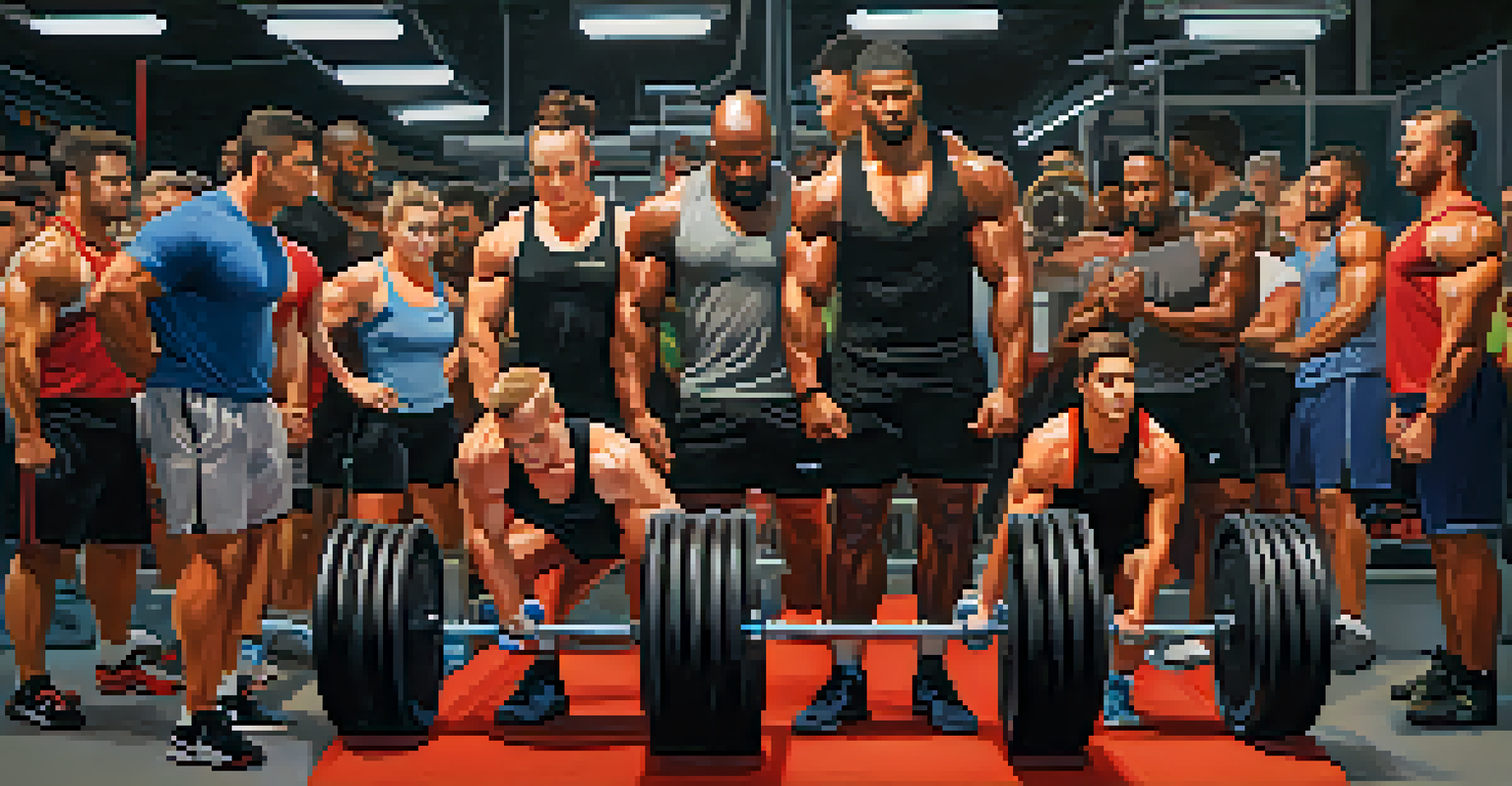Powerlifting Nutrition: Fueling Your Body for Weight Loss

Understanding Powerlifting and Its Nutritional Needs
Powerlifting is a unique sport focused on three main lifts: squat, bench press, and deadlift. To excel in these lifts, your body requires the right fuel, which means understanding the nutritional needs specific to powerlifters. This involves balancing macronutrients—proteins, fats, and carbohydrates—in a way that supports strength while also promoting weight loss.
Nutrition is not just about eating, it's about learning to live.
Unlike some athletes who may prioritize endurance, powerlifters benefit from a nutrition plan that enhances muscle growth and recovery. This is crucial because lifting heavy weights creates micro-tears in muscles, requiring adequate nutrition for repair and growth. Hence, understanding how to fuel your body effectively can lead to significant progress in your lifts.
In this article, we’ll explore how to tailor your nutrition specifically for powerlifting while keeping weight loss in mind. By the end, you’ll be equipped with practical tips to maximize your performance and achieve your weight loss goals simultaneously.
The Importance of Macronutrients for Powerlifters
Macronutrients are the building blocks of your diet: proteins, fats, and carbohydrates. For powerlifters, protein is particularly vital since it aids in muscle recovery and growth. Aiming for about 1.2 to 2.0 grams of protein per kilogram of body weight can help you maintain muscle mass while losing weight.

Carbohydrates often get a bad rap in weight loss discussions, but they are essential for fueling intense workouts. They provide the energy needed for those heavy lifts and can help you recover effectively afterward. Including complex carbs like whole grains, fruits, and vegetables can keep your energy levels stable throughout the day.
Macronutrients Fuel Performance
Balancing proteins, fats, and carbohydrates is essential for powerlifters to enhance muscle growth and recovery while aiming for weight loss.
Fats also play a crucial role, serving as an energy source and supporting hormone production, which is vital for muscle growth. Healthy fats from sources like avocados, nuts, and olive oil should be incorporated into your diet to ensure a well-rounded nutritional profile that supports your powerlifting endeavors.
Creating a Balanced Meal Plan for Weight Loss
A balanced meal plan is key to ensuring you get the right nutrients while working towards weight loss. Start by calculating your daily caloric needs based on your activity level, then create a plan that includes a mix of proteins, carbs, and fats. This will help you stay within your calorie limits while still fueling your workouts.
Your body can stand almost anything. It’s your mind that you have to convince.
Consider meal prepping to make your life easier during busy weeks. Preparing meals in advance ensures that you have healthy options readily available, reducing the temptation to reach for convenience foods that may derail your progress. Incorporate a variety of foods to keep meals interesting and satisfying.
Remember, it’s not just about what you eat, but when you eat it. Timing your meals around your workouts can optimize performance and recovery. Eating a balanced meal with protein and carbs about an hour before your training can provide the energy you need, while a post-workout meal helps with recovery.
Hydration: A Critical Component of Powerlifting Nutrition
Hydration is often overlooked in nutrition discussions, but it plays a crucial role in performance and recovery for powerlifters. Dehydration can lead to decreased strength and endurance, so it's essential to drink enough water throughout the day. Aim for at least 3-4 liters daily, adjusting based on your activity level and climate.
Electrolytes, such as sodium, potassium, and magnesium, are also important, especially during intense training sessions. These minerals help maintain fluid balance in your body and can enhance performance. Including electrolyte-rich foods like bananas, spinach, and nuts can naturally replenish these essential nutrients.
Hydration Boosts Strength
Staying properly hydrated and replenishing electrolytes is crucial for maintaining strength and endurance during powerlifting workouts.
Don’t wait until you’re thirsty to drink water, as this can be a sign that you’re already dehydrated. Instead, make hydration a habit—carry a water bottle with you, set reminders, or incorporate hydrating foods like cucumbers and watermelon into your diet. This proactive approach will keep your body performing at its best.
Supplements: Do You Need Them for Weight Loss?
Supplements can be a helpful addition to your nutrition plan, but they shouldn’t replace whole foods. While some may promise quick results for weight loss, it's important to approach them with caution and focus on a balanced diet first. Common supplements for powerlifters include protein powders, creatine, and branched-chain amino acids (BCAAs).
Protein powders can be a convenient way to meet your daily protein goals, especially post-workout. However, prioritize getting most of your protein from whole food sources like chicken, fish, and legumes. Creatine, on the other hand, can help improve strength and high-intensity performance, making it a popular choice among powerlifters.
Before adding any supplement to your routine, consult with a healthcare professional or a nutritionist. They can help you determine what's necessary for your specific needs and goals, ensuring you’re supplementing wisely rather than relying on quick fixes.
Listening to Your Body: Adjusting Nutrition as Needed
Every individual’s body responds differently to nutrition, so it’s essential to listen to yours and adjust accordingly. Pay attention to how certain foods make you feel during workouts and throughout the day. If you notice a dip in energy or performance, it might be time to tweak your meal plan or eating schedule.
Tracking your food intake and performance can provide valuable insights into what works for you. Consider keeping a journal to note not only what you eat but also how you feel and perform. This can help you identify patterns and make informed adjustments to your nutrition strategy.
Mindset Matters in Nutrition
A positive attitude towards food and realistic goal-setting can significantly impact your success in powerlifting and weight loss.
Lastly, don’t forget that weight loss is a gradual process. It’s important to be patient and kind to yourself as you work towards your goals. Celebrate small victories and remember that flexibility in your nutrition plan can lead to long-term success.
The Role of Mindset in Powerlifting Nutrition Success
Mindset plays a significant role in nutrition and weight loss, especially in a demanding sport like powerlifting. Developing a positive relationship with food can help you avoid the guilt often associated with dieting. Instead of viewing food as the enemy, see it as the fuel that powers your strength and recovery.
Set realistic goals that focus on health and performance rather than solely on the number on the scale. This approach can help you stay motivated and committed to your nutrition plan. Remember, progress is not always linear, and it’s essential to recognize and celebrate non-scale victories, like increased strength or improved recovery.

Surround yourself with a supportive community, whether it’s through friends, family, or online forums. Sharing your journey with others can provide encouragement and accountability, making it easier to stay on track with your nutrition and powerlifting goals.